人教版九年级英语unit2
人教版英语九年级全一册unit2笔记
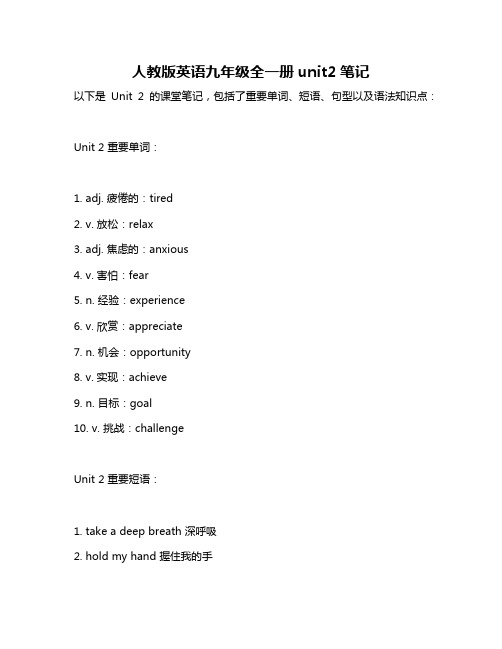
人教版英语九年级全一册unit2笔记以下是Unit 2的课堂笔记,包括了重要单词、短语、句型以及语法知识点:Unit 2 重要单词:1. adj. 疲倦的:tired2. v. 放松:relax3. adj. 焦虑的:anxious4. v. 害怕:fear5. n. 经验:experience6. v. 欣赏:appreciate7. n. 机会:opportunity8. v. 实现:achieve9. n. 目标:goal10. v. 挑战:challengeUnit 2 重要短语:1. take a deep breath 深呼吸2. hold my hand 握住我的手3. calm down 冷静下来4. get butterflies in my stomach 心头鹿撞5. worry about 为...担心6. be nervous about 对...感到紧张7. be anxious about 对...感到焦虑8. be scared of 对...感到害怕9. look forward to 盼望,期待10. in the future 在未来Unit 2 重要句型:1. I feel tired these days. (现在时态,描述当前状态)2. I was really nervous before the big speech. (过去时态,描述过去发生的动作)3. I will challenge myself to do things I didn't think I could do before. (将来时态,描述将来的动作)4. It's important to learn how to deal with stress. (形式主语,强调某事的重要性)5. I look forward to hearing from you. (固定句型,表示期待)6. I have a goal to achieve. (动词不定式作后置定语,表示目标)7. It's a waste of time doing sth. (动名词作主语,表示某事是浪费时间)8. I'm sorry to hear that you're feeling down. (固定句型,表示同情或安慰)9. The best way to relax is through exercise. (动词不定式作后置定语,表示放松的最好方式)10. I will try my best to get the job. (动词不定式作目的状语,表示努力) Unit 2 语法知识点:1. 现在完成时态(Present Perfect Tense):用于描述过去发生的动作对现在的影响或结果。
九年级英语unit2单词表人教版
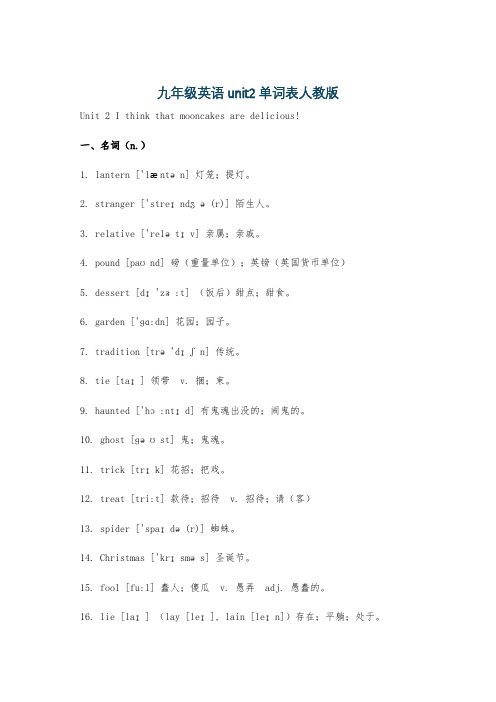
九年级英语unit2单词表人教版Unit 2 I think that mooncakes are delicious!一、名词(n.)1. lantern ['læntən] 灯笼;提灯。
2. stranger ['streɪndʒə(r)] 陌生人。
3. relative ['relətɪv] 亲属;亲戚。
4. pound [paʊnd] 磅(重量单位);英镑(英国货币单位)5. dessert [dɪ'zɜ:t] (饭后)甜点;甜食。
6. garden ['ɡɑ:dn] 花园;园子。
7. tradition [trə'dɪʃn] 传统。
8. tie [taɪ] 领带 v. 捆;束。
9. haunted ['hɔ:ntɪd] 有鬼魂出没的;闹鬼的。
10. ghost [ɡəʊst] 鬼;鬼魂。
11. trick [trɪk] 花招;把戏。
12. treat [tri:t] 款待;招待 v. 招待;请(客)13. spider ['spaɪdə(r)] 蜘蛛。
14. Christmas ['krɪsməs] 圣诞节。
15. fool [fu:l] 蠢人;傻瓜 v. 愚弄 adj. 愚蠢的。
16. lie [laɪ] (lay [leɪ], lain [leɪn])存在;平躺;处于。
17. novel ['nɒvl] (长篇)小说。
18. eve [i:v] 前夕;前夜。
19. bookstore ['bʊkstɔ:(r)] 书店。
20. dead [ded] 死的;失去生命的。
21. business ['bɪznəs] 生意;商业。
22. punish ['pʌnɪʃ] 处罚;惩罚。
23. warn [wɔ:n] 警告;告诫。
24. present ['preznt] 现在;礼物 adj. 现在的。
Unit2+核心词汇课件++2023-2024学年人教版九年级英语全册+
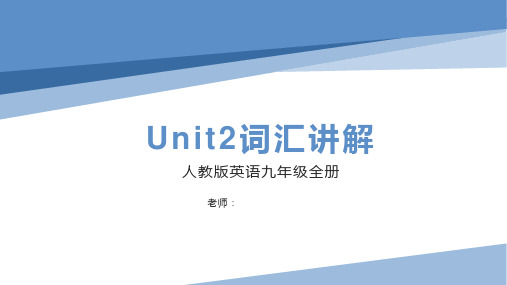
Unit2 词 汇 讲 解
32. present n. 现在; 礼物 at present 目前,现在 adj. ① 现在的 I’m satisfied with my present job. ②出席的,在场的 修饰名词要后置 absent缺席的 Eg: There were 200 people present when the meeting started. v. 展现,表现,呈现 Eg: You need to present yourself better.
Unit2 词 汇 讲 解
5. put on ①穿上, 戴上; Eg: The woman put on her coat and left the house. ②增加体重 weight , 发胖; Eg: I put on 10 pounds last year. Larry has put on too much weight because of his unbalanced diet. ③上演 Eg: They will put on a new play at the end of the year. 【短语拓展】put相关短语: put away将...收起put off 推迟put down放下;记下put up建造;张贴
Unit2 词 汇 讲 解
21. treat n. 款待;招待 give sb. a treat 招待某人 Eg: Let's go out for lunch—my treat. 咱们到外面去吃午餐吧,我请客。 v. ① 招待;请 客 treat sb. to sth. 请某人吃某物,用某物款待某人 Eg: Let me treat you to some juice. 让我请你喝点儿果汁吧。 ② 把...视为/看作... treat... as... =consider/see/regard... as... Eg: They treat the dog as a member of their family. ③ 治疗 Eg: The doctor is treating her for her illness.
(全)人教版九年级英语上册Unit 2单词及重点短语(附例句)

人教版九年级英语上册Unit 2单词及重点短语(附例句)Unit2 I think that mooncakes are delicious!【重点单词】1.Mooncake ['mu:nkeɪk] n. 月饼△The moon cake made by grandma is delicious!奶奶做的月饼味道美极了。
△People gather around the table to eat moon cakes and enjoy the moon on the 15th of August every year.每年8月15日,人们围坐在桌子旁吃月饼,赏月。
ntern [ˈlæntə(r)n] n. 灯笼△Red lanterns are hung on both sides of the street on the Lantern Festival. 元宵节的时候,街道两旁都挂着红灯笼。
3.stranger [ˈstreindʒə(r)] n. 陌生人△Don't talk to strangers.不要和陌生人说话。
△How many strangers have come to our community today?今天有多少陌生人来到我们的社区?4.relative [ˈrelətiv] n. 亲属;亲戚△On the first day of new year's day, our parents took us to visit relatives. 在元旦的第一天,我们的父母带我们去拜访亲戚。
5.put on 增加(体重);发胖△During the outbreak, many people put on a lot of weight. 在疫情爆发期间,很多人的体重都增加了很多。
6.pound [paund] n. 磅(重量单位);英镑△Grace has 500 pounds.格蕾丝有500英镑。
人教版英语九年级unit2知识点

Unit 2 I think that mooncakes are delicious!Language points and summary1. stranger n. 陌生人(可数名词)strange adj. 陌生的,奇怪的e.g. Don’t talk to strangers. 不要和陌生人说话。
There is nothing strange in the room. 房间里没有奇怪的东西。
2. relative n. 亲属,亲戚(可数名词)e.g. They have a lot of relatives. 他们有许多亲戚。
3. put on 增加(体重);发胖;穿上e.g. They’ve put on five pounds. 他们体重增加了5磅。
It’s cold outside. Please put on your coat. 外面冷,请穿上大衣。
4. pound n. 磅;英镑(可数名词)e.g. The desk weighs 5 pounds. 这张课桌重5磅。
5. People go on the streets to throw water at each other.throw at 抛向;泼向;洒向动词throw后接所投掷的物体,用介词at引入泼洒的对象。
e.g. On our way here, someone threw a stone at our car, but fortunately wewere not hit.在我们来的路上,有人向我们的车投掷石块,所幸的是我们没被砸中。
It’s the first snow of the year, and the children are happily throwing snowballs at each other.这是今年的第一场雪,孩子们高兴地拿雪球相互抛着。
1. Chinese people have been celebrating Middle-Autumn Festival andenjoying mooncakes for centuries.for centuries 几百年2. They carry people’s wishes to the families they love and miss.它们把人们的祝愿带给他们热爱和想念的家人。
人教版九年级英语Unit2单词和词组
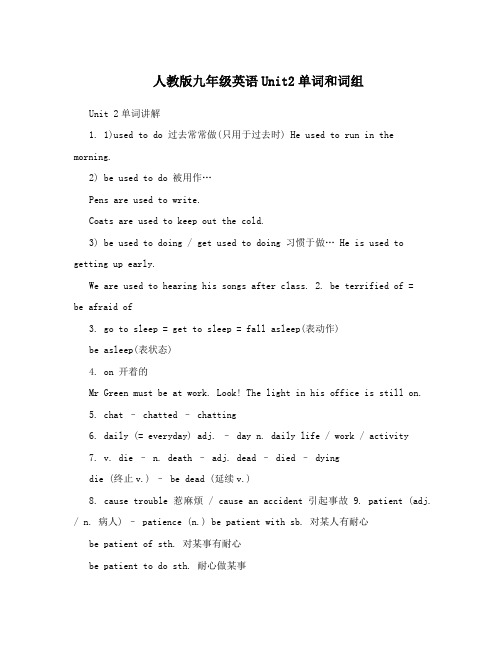
人教版九年级英语Unit2单词和词组Unit 2单词讲解1. 1)used to do 过去常常做(只用于过去时) He used to run in the morning.2) be used to do 被用作…Pens are used to write.Coats are used to keep out the cold.3) be used to doing / get used to doing 习惯于做… He is used to getting up early.We are used to hearing his songs after class. 2. be terrified of =be afraid of3. go to sleep = get to sleep = fall asleep(表动作)be asleep(表状态)4. on 开着的Mr Green must be at work. Look! The light in his office is still on.5. chat – chatted – chatting6. daily (= everyday) adj. – day n. daily life / work / activity7. v. die – n. death – adj. dead – died – dyingdie (终止v.) – be dead (延续v.)8. cause trouble 惹麻烦 / cause an accident 引起事故 9. patient (adj. / n. 病人) – patience (n.) be patient with sb. 对某人有耐心be patient of sth. 对某事有耐心be patient to do sth. 耐心做某事10. in the end = at last / finally11. make a decision to do sth. = decide to do sth. 下决心做某事,决定做某事12. to one’s surprise / joy / disappointment 令某人惊讶/高兴/失望的是……13. even though = even if14. no longer = not … any longerThey no longer worked there. = They didn’t work there any longer.15. take pride in = be proud of 对……感到自豪;为……而骄傲 16. pay attention to + n. /代词/ v.ingPlease pay attention to your pronunciation.You should pay attention to spelling.17. give up + n. / v.inggive it / them upFor your health, you must give up smoking.Never give up your dreams!18. waste1) v. We mustn’t waste our time.He always wastes time playing computer games.2) n. I think it is just a waste of time playing computer games. 3) adj. This old man makes a living by collecting waste things.。
人教版九年级英语上册Unit2重要知识点详解
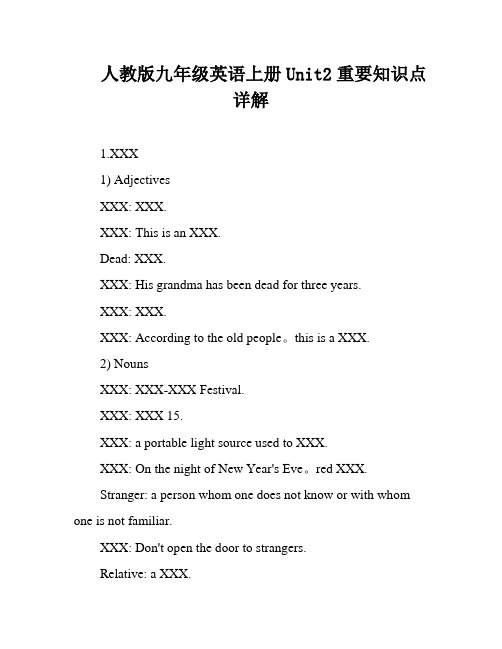
人教版九年级英语上册Unit2重要知识点详解1.XXX1) AdjectivesXXX: XXX.XXX: This is an XXX.Dead: XXX.XXX: His grandma has been dead for three years.XXX: XXX.XXX: According to the old people。
this is a XXX.2) NounsXXX: XXX-XXX Festival.XXX: XXX 15.XXX: a portable light source used to XXX.XXX: On the night of New Year's Eve。
red XXX.Stranger: a person whom one does not know or with whom one is not familiar.XXX: Don't open the door to strangers.Relative: a XXX.XXX: His XXX.Goddess: a XXX.XXX: Chang'e is a goddess in the Moon Palace.Dessert: a sweet course served at the end of a meal.XXX: Children like to have XXX.XXX: a piece of ground where flowers。
vegetables。
or fruit are grown.XXX: There are all kinds of XXX.XXX: a long。
narrow piece of cloth worn around the neck.XXX: XXX.Ghost: an n of a dead person.XXX: This is a story about ghosts.XXX: a XXX.XXX: Boys like to play tricks.Treat: an event or item that is out of the ordinary and gives great pleasure.XXX: We were treated to a XXX XXX.二、【重点句型】1.It's said that。
人教版九年级英语unit2重点知识

九年级unit2重点知识1. strange adj. 陌生的,奇怪的stranger n. 陌生人2. put on 增加(体重),发胖; 穿上eg: She never puts on weight.她从来不会发胖。
Today is cold, put on your coat.今天很冷,穿上你的外套。
3.pound n. 磅(重量单位) eg: five pounds4. folk adj. 民间的,民俗的eg: folk music 民谣5. god n. 神goddess n. 女神6. whoever无论谁, 不管什么人eg: Whoever comes will be welcome.无论谁来都会受欢迎。
I won't open the door, whoever you are.无论你是谁,我都不会开门。
7. steal v. 偷stole stolenA thief stole my wallet.一个小偷偷了我的钱包。
8. lay v. laid 放置,安放; 产卵,下蛋eg: Please lay the trials in the office.请把这些椅子放到办公室。
The hens lay eggs every day.这些母鸡每天下蛋。
9. lay out 摆开, 布置10. tradition n. 传统traditional adj. 传统的traditionally adv. 传统地a tradition of... ...的传统11. admire v. 欣赏, 仰慕, 钦佩eg: I admire her.12. tie n. 领带v. 捆, 绑eg: He always wears a tie.They tie the bad man to a tree.13. trick n. 花招, 把戏play a trick on sb 戏弄某人14. treat n. 款待,招待; v. 招待, 请客eg: Thanks for your treat.15. lie v. 存在, 平躺, 处于eg: Hai Nan lies in the south of China.海南位于中国南部。
- 1、下载文档前请自行甄别文档内容的完整性,平台不提供额外的编辑、内容补充、找答案等附加服务。
- 2、"仅部分预览"的文档,不可在线预览部分如存在完整性等问题,可反馈申请退款(可完整预览的文档不适用该条件!)。
- 3、如文档侵犯您的权益,请联系客服反馈,我们会尽快为您处理(人工客服工作时间:9:00-18:30)。
• She also told me that even though my father was no longer with us , he was watching me and would always take pride in everything good I do. • even though 尽管,即使 (引导让步状语从句) • no longer 不再=not…any more/longer • take pride in=be proud of 以……而自豪
过去常常…… 被用于做…… 被用于做…… 习惯于做…… 变得习惯于做……
My father used to watch sports news.
She is used to staying late at night. She gets used to chatting with friends online
1. Used to be
• • • • •
+ 过去常常是……
Adj.
n.
I used to be really quiet. I used to be afraid of the dark You used to be short. I used to be a teacher. I used to be a quiet boy.
1.______work in Microsoft? B A. Did you used to B. Did you use to C. Do you used to D. Do you use to B 2.Where ______live before you came here? A. did you used to B. did you use to C. use he to D. he used to 3.Didn’t he use to have long hair? A _____, but now he’s bald. A. Yes, he did. B. No, he didn’t. C. Yes, he didn’t. D. No, he did.
Be afraid of =be terrified of 害怕……
Be afraid to do =be terrified to do 害怕做…… Terrify v. 使……害怕、恐惧 What terrifies you?
Snakes used to terrify me when I was a child.
Rose Tang now
Get up early Stay in school all day ___________ No time to play games Study No time _________for concerts Do homework ____________and go to bed.
love I _______gym.
Rose Tang then
Have much time A lot of time to play games ____________ Watch TV Chat with grandmother Go to concert with my father ___________
take, spend, cost, pay spend • He used to ______ a lot of time playing computer games. • Sb. Spend +时间或金钱+(in)+ doing sth. took • It _____ me two hours to do my homework yesterday. • It takes sb.+时间或金钱 +to do sth. pay • How much did you _____ for this dress? • Sb.+ pay+时间或金钱+for sth. spent • You can not imagine how much I _____ on this coat. Is it beautiful? • Sb. Spend +时间或金钱+on sth. • The new TV _____ me $3000 cost • Sth. +cost +sb.+ 金钱
First-reading
What trouble did Martin use to have?
He used to have no interest in studying
He got into trouble with the police. He has been afraid of being alone after his father died
What’s your problem?
Second-reading
• How was he able to change • And didn’t give up trying to help him • That’s when I decided to change • After his father’s death a few years ago • Even the teacher agreed that Martin was wasting his time
A. There ,be The computers are
The computers are
B. There, have
There used to be… 过去常常有……
used to give lessons.
used for giving lessons. used to
I am
used to reading aloud in the morning.
Difficult sentences
• The head teacher said it was necessary for Martin to talk with his mother. Adj. 必要的 • It +be + adj.+ for sb.+ to do • It was exactly what 表语从句 • My mother helped me to understand how much she had given me. 宾语从句 I needed.
I used to…,but now I …
Activity Eat… Read… Watch…on Tv
Do…at school
Past Junk food comics cartoon
Play bsketball
Now Healthy food newspapers Soap opera
Do homework
A:Did you used to be afraid of the dark? B:Yes, I did. A:Are you still afraid of the dark? B:No, I’m not. How about you? A:Me? Oh, yes! I’m terrified of the dark. B:So, what do you do about it? A:I go to sleep with my bedroom light on.
every school day after We _____________ just study school. all the time.
We used to walk ______to school. I used to hate ___________. gym class We have to ____________ take a bus to school.
I used to like...
Gym class Painting pictures Music class Spiders and other insects
in the past
Now
I didn’t use to like tests. I don’t worry about tests. play We used to ______
He doesn’t wear a pair of glasses
What’s he/she like?
outgoing
funny
atheletic
friendly
calm
clever
cute
What did his friends use to look like? glasses Mario used to be short. He used to wear ________. short hair tall Amy used to be ____. She used to have _________. blonde curly Tina used to have _______ and ______ hair. Used to be 过去常常是…… Used to do 过去常常做某事
What does he/she look like?
He is tall. He is short.
She is fat. She is thin.
She has long and straight hair
He wears a pair of glasses
He has short and curly hair.
4.He used to like reading comics. (改为否定句) He didn’t use to like reading comics.
1.The little boy used to be thin,__________ he? A. didn’t B. don’t C. doesn’t 2.____used to ___an old desk in my room.
